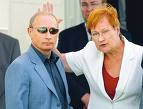Šveitsi pangad: Ida-Euroopa on ohutsoonis
 Vahelduseks toon siinkohal ära ühe tänase analüüsi Šveitsi pankade poolt, kus kirjeldatakse Vene-Gruusia sõja võimalikke mõjusid Ida-Euroopa majandustele. Jätan täpsema allika enda teada, kuid lugemist väärib see küll.
Vahelduseks toon siinkohal ära ühe tänase analüüsi Šveitsi pankade poolt, kus kirjeldatakse Vene-Gruusia sõja võimalikke mõjusid Ida-Euroopa majandustele. Jätan täpsema allika enda teada, kuid lugemist väärib see küll.The invasion by Russia of Georgia's territory is a watershed event whichraises two important questions:
* Why is Russia attempting to shut down Georgia's main oil pipeline?Preliminary reports seem to indicate attempts by Russia to bomb the pipelinewhich delivers up to 1m barrels per day into Western Europe. Now of course,Russia may simply be trying to cripple Georgia economically. Or Russia mayhave grown accustomed to living off the returns of high oil price and, justas Iran seems to rattle the cage each time oil prices head south, Russia maybe attempting to forestall a world of lower oil prices. Some of the recentcommentaries we have read suggest as much. However, we highly doubt that thereal explanation behind the past weekend's military actions is driven by therecent pull-back in oil prices. Instead, by targeting Georgia's oilpipeline, Russia may instead be sending a message to Europe to stay out ofthe dispute or face the consequences of a winter without energy-which bringsus to what we think is the true explanation behind Russia's actions....
* Is Russia attempting to lay-out some sort of "Monroe doctrine"? That is,is Russia marking Eastern Europe as its sphere of influence-where otherpowers have no business meddling in-and serving notice to its formersatellites that they better behave, or else? Judging from the outside, thisis undeniably what Russia's recent actions feel like. And this has to beterrible news for Eastern European equity and currency markets. After all,Russia's actions will likely trigger serious outflows of capital, at a timewhen a number of Eastern European countries are already running perilouslydangerous current account and fiscal deficits. Indeed, imagine being aUkrainian or Latvian businessman; how would you not find Russia's actionsalarming? And why would you not react by hiding as much of your capital awayin Switzerland or Cyprus as you could? Meanwhile, if you are the Turkish,Lithuanian or Ukrainian governments, won't Russia's incursion into Georgiacompel you to increase your defense spending, just at the time you can leastafford it? After all, Russia's intervention may well open up a new can ofworms all around the old Soviet empire, since sizeable Russian minoritieslive not only in Georgia's South Ossetia region, but can also be found inthe Baltic countries, Kazakhstan, Ukraine, Armenia.... What will happen ifKazakhstan's Russian minority wants to claim independence, or re-attachmentto Russia? Given this precedent, will Russia reserve the right to intervenemilitarily wherever sizeable Russian minorities live (and does that meanthat Mayfair and Chelsea should expect to see Russian tanks)? And, if so,should Germany claim the same rights in regards to the German minoritiesliving in Czechoslovakia, Poland or Alsace? (Oops, sorry. That one was triedbefore.)
Now without wanting to fall into outright alarmism (hopefully this currentcrisis can rapidly draw to a close and come to some negotiated settlement)and stretched historical comparisons, it is nonetheless a reality that,apart from the 1974 Turkish invasion of Cyprus, an armed conflict betweentwo European sovereign states, recognized by the whole internationalcommunity, has not happened since the end of WWII (the breakdown ofYugoslavia does not really count, as the various states were not recognizedand often did not have full fledged armies). So we feel this is a big deal.If nothing else, it demonstrates a new assertiveness by Russia in itsrelations with other European countries. It also risks triggering moreinstability across the whole region. Already, the Georgia-Russia battle hasopened a window of opportunity for Abkhazian independence fighters tore-ignite their struggle. And others around the old Soviet Empire may followthat path, since a pretty poor precedent has now been set-a precedent whichbids nothing good for Eastern European equity and currency markets.



Kommentaarid